ForgiveNest Podcast Transcript: ACIM | Transcending the Ego's Scarcity Principle - A Meditation on Having, Sharing and Being, with Alison Anton
"Into the hands that give, the gift is given. Look on your brother and see in him the gift of God you would receive.” [ACIM CE T-19.IV.D.17:1-3]
This is Alison Anton. You're listening to the ForgiveNest Podcast for A Course in Miracles, your place to explore ACIM topics in meditation, healing, and your special function in forgiveness.
Several weeks ago, Jesus appeared in my meditation. He all of a sudden was sitting in front of me and offered me a glowing ball of light that fit into the palm of his two hands cupped together. Just as I touched the ball so I could bring it into my own hands, the ball was both in my hands and also in his.
There were now two balls of light, and we each had one. While I clearly received it, he also clearly retained it.
Suddenly, someone appeared next to me, and Jesus asked me to give the ball I had in my hands to this new person. I'm pretty sure you can already guess what happened. The moment I offered the ball, a new ball appeared in the other person's hands, but I still retained the one I had too. Jesus had a ball, the person next to me had a ball, and I had one.
As that transpired, another person appeared on the other side of me, and I was again asked to give this person the ball I had. And so I did. "Into the hands that give, the gift is given." And we sat there together, each one of us with a ball that could neither be lost as we gave it away or withheld as our own as we received it.
This continued over and over. People appeared all around us, behind us, next to us, everywhere. Everyone receiving and giving these balls of light. And soon, the transfer of balls became instantaneous. And what appeared before to be separate steps of 1) giving and 2) receiving, were just one.
This became so seamless that even the balls themselves disappeared and what was left was simply a transference of pure light between all of us at the same time, like a chain of light that bonded us together. Giving and receiving became simply sharing what we already had between us.
The idea of something I had or that I possessed, and something that I had to give or sacrifice totally left my mind. There wasn't any "thing" anymore to hold on to or any "thing" anymore to give away.
Think about this: Why would any of us have to hold onto the concept of getting something and giving something anymore if what we had was already within us? We wouldn't even be able to find the words, "want", "get" or "give" in the dictionary anymore. They wouldn't make any sense anymore as concepts. These are ego concepts, and there's literally no ground or foothold for the ego here.
Game over.
Jesus in A Course in Miracles calls this foothold that the ego tries so desperately to maintain the "scarcity principle”. [ACIM CE T-4.IV.1:4-5] We could also call it the principle of perceived lack.
I'd like to speak to this a little using my own musings of how the scarcity principle underlies the entire process when it comes to the traditional idea of giving and receiving in the world. I see this as a three part set of equations.
This isn't in the Course per se, but it's based off the many references Jesus makes on the nature of how the ego wants, gets, and gives based on its underlying scarcity principle.
The first of these ego equations is: Wanting equals Fearing equals Doing. (We'll break this down in a sec.)
The second equation is: Having equals Fearing equals Doing.
And the third, as you might guess, is: Giving equals Fearing equals Doing.
In each of these three, fearing and doing follow in line after the basic concepts of wanting, having and giving.
So let's break each of these apart so you can see where I'm going here.
The first again is wanting equals fearing equals doing. The whole ego cycle starts with wanting something we don't think we have. There's always something we want to own, a person we want to be in relationship, or a place, or a position we want to be in; something we don't currently possess, but we have desire to have it. It's a resource we think we need.
(And a side note here, I'm going to come back to this word "resource" in a bit, because it means something in our discussion when we talk about the spirit's version of giving and receiving. We'll get to that after we break each of these ego versions down first.)
So inherently, in wanting to get this resource, whatever it is, is the obvious perception that we don't have it in the first place. If we had it, we wouldn't need to get it. We can see how the scarcity principle is the ground for this equation. Something's lacking in the first place.
And always under lack is what? Wanting equals fearing. Or we could just as easily say fearing equals wanting. It's frightening when we don't have a thing we think we need. If we want it and need it, it must be valuable to us.
So fear naturally accompanies wanting here, which leads into the next piece of the equation for all three: Doing. Wanting equals fearing equals doing, because we might do anything now to get this thing because we perceive a lack that threatens our physical or our identity survival. Wanting equals fearing equals doing something to get it.
Okay, then the next ego equation always follows: Having equals Fearing equals Doing.
So let's say now we have the thing we wanted. But, since we still perceive the scarcity principle at work, for example, we can see this lack everywhere as we witness other people wanting what we have, or we see people fighting over this same resource, or we see people suffering from not having this resource, we're still fearful.
Of course, we're probably also relieved we have this resource for ourselves and a bit pumped up that we got this thing or this person or this position or whatever it is, but we're still deeply fearful. But now the fear is about losing the resource we have, whereas before it was a fear of not getting it in the first place.
So the fearing part is indeed still here. Having equals fearing. It just looks different. From here, like last time, we now have to do something to make sure we keep this thing as our own possession. By all means, don't lose it. We have to do something to maintain what we have; sometimes the doing is even just running a broken record of fear thoughts that can take over our mind.
And the last one of these equations is giving equals fearing equals doing.
This one always comes after we think we have enough of something as our own, because giving implies we have enough to give. But the pattern, as you can guess, is the same.
The ego's concept of giving is, again, based on lack or scarcity. To give something in the ego's eyes means you must give it away. It's gone from my hands and now it's in yours. You have it now, and I don't have it now.
This is another version of being afraid of losing what we already have, but this time we get to control the losing of it because we're the ones who voluntarily choose to lose it. We give what feels safe based, of course, on our current scarcity assessment.
In this case, giving can still feel like losing, or a sense of sacrificing. Even if it feels good on some level to give, we likely also have that sense of sacrifice; that little pang of fear coming along for the ride. As we have seen, what goes hand in hand with all of these is fearing and doing.
All three—wanting, having and giving—represent fear to the ego as well as the need to do something, as an effort to try to not be in fear. But not so ironically, since the ego's version of having and giving anything literally is fearful, fear will never be removed from the ego's equation in any of these.
In fact, in order for there to be an equation that doesn't include fear at all, the ego simply can't be involved. It knows this, and that's why it keeps this complicated fear system in place. Fear keeps the ego's dice rolling in its favor. It doesn't even matter what numbers are rolled. It'll use any number to its advantage as long as fear underlies the game.
Bottom line is that fear is at the root of everything the ego needs because the ego's source is... nothing.
Here's where we bring back the word “resource” and why this word matters when it's pitted next to its word origin. The origin of resource is source. A resource comes from a source.
The question then is, what is the source of all these resources the ego wants so much and thinks we need to have?
If you practice the Course, you know the ego is not based in reality. In other words, it's not based in God. As a false idea not created, and therefore not within the mind of God, the ego's source is truly nothing. The resources it wants are finite because its entire concept of its source is finite.
And technically—I think Jesus would also agree here—the scarcity principle should really be called the nothingness principle. There's not just a scarcity in resources, there's nothing at all, because the source, too, is nothing.
This obviously is terrifying to the ego, who knows deep down that it's grasping at straws. It's only a matter of time before it's game over. One day, we'll stop trying to roll the dice at all, because the dice themselves and the entire board game we're playing on isn't real. It's game over. Game over because we simply don't want to play anymore.The mind remembers its true Source and just wants only to be there.
The Course says, as spirit, we are the thought or the idea of God, and "ideas leave not their source”. [CE W-132.10:3] What Jesus is saying here is that the “true us”—not the ego or the body—is within the eternal, endless, constant mind of God. Let's hold that thought for just a second. We are inside our Source.
Our Source doesn't need to hand out resources because we're already inside. We were created by Him and kept within Him simply because He wanted to share Himself with us.
Here's a quick passage from chapter four of the Complete Edition of the Course text to summarize this:
"God, who encompasses all being, nevertheless created distinct beings who have everything individually, but who want to share it to increase their joy. Nothing that is real can be increased except by sharing it. That is why God Himself created you." [CE T-4.X.7:1-3]
In other words, our Source shares. And the only thing that can be shared between us is Him. The spirit's equation then for having is very, very simple. All the complicated steps the ego made of getting, having, and giving, those are gone. And the equation simply becomes: Sharing equals Being.
The giving and receiving parts automatically cancel themselves out with the single concept of sharing what we already have; what our Source continually gives us.
The ego's concept of doing is also canceled out. That's exchanged for a simple, pure, constant state of being in God's joy, which is continually shared. Being is sharing. Sharing strengthens the joy of God and keeps us eternally connected to each other and to our Source. Essentially sharing is communication, and is who we are.
"God, who encompasses all being, nevertheless created distinct beings who have everything individually, but who want to share it to increase their joy. Nothing that is real can be increased except by sharing it. That is why God Himself created you."
Now, of course, I know we need resources while we're here in bodies learning from Jesus and the Holy Spirit how to return to our natural state as spirit. Jesus says they will never take these things—these resources—from us. They're ideas we still believe in, and it's ourselves that need to change our minds in what we value. Jesus is confident that we will eventually value what God gives us versus the ego.
He asks us to pursue the loftiest of goals, and the first part of that is simply to reimagine what it would be like if we were to turn the ego's scarcity principle upside down. Him and the Holy Spirit will heal our mind that thinks it's split from God, but They do it in a very gentle way and at a pace we can handle.
Let's end today with a condensed version of the exercise Jesus gave me in meditation. You can close your eyes if you want, but you don't need to.
Imagine Jesus in front of you with a glowing ball of brilliant light.
In this light, you see his joy in simply being with you.
As he shares his joy, you feel an inestimable sense of worth.
The ball is now in your hands, as well as his, and as brothers, together, you say to your Source:
"We thank you, Father, that we cannot lose the memory of You and Your love. We recognize our safety, and give thanks for all the gifts You have bestowed on us, for all the loving help we have received, for Your eternal patience, and the Word that you have given us that we are saved." [CE W-234.1-2]
Amen.
And I'll leave you with that to ponder.
Thanks for joining me on the ForgiveNest Podcast. I'm Alison Anton.
It was great talking to you.

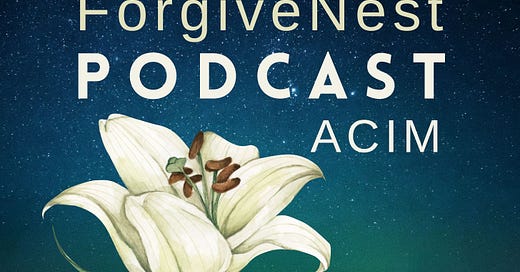




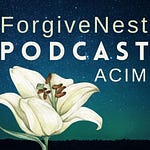

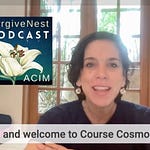
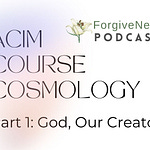
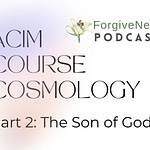
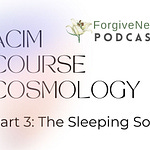
Share this post